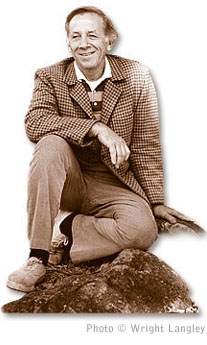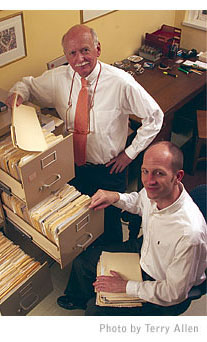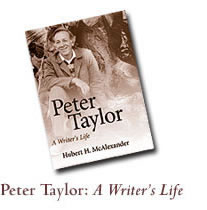


Hubert McAlexander chronicles the lives, times and works of two Southern authors
by Kathleen Cason
Intro
| A Mississippi lady | Writing
a writer's life
|
Patience and Fortitude


Peter Taylor, one of the finest short-fiction writers of the 20th century, led a rather undramatic private life. Taylor garnered many literary awards, including a Pulitzer Prize for his novel, A Summons to Memphis.

English
Professor Hubert McAlexander (left) and research assistant Brad Edwards,
a doctoral student in English, accumulated many file drawers of information
and documents on Peter Taylor's life.

Critics
regard Tennessee-born Peter Taylor (1917-1994) as one of the finest writers
of short fiction in 20th century America. Hubert McAlexander's portrayal
of the Pulitzer Prize winner captures Taylor's personal and professional
life and the literary world in which he lived. Seven of Taylor's stories
were chosen for the O. Henry Prize collection; 10 stories appeared in
the Best American Short Stories anthologies.
Novels
A Summons to Memphis (1986)
In the Tennessee Country (1994)
Short
Stories
A Stand in the Mountains
Short
Stories
In the Miro District
The Old Forest
1939
At the Drugstore
Cousin Aubrey
Dean of Men
Miss Leonora When Last Seen
Their Losses
Venus, Cupid, Folly and Time
Writing a writer's life
The drama of Bonner's life was notably lacking in Peter Taylor's. And that presented challenges writing Peter Taylor: A Writer's Life.
"Taylor lived a private life. He mainly lived to teach and to write," said Hugh Ruppersburg, UGA associate dean of arts and sciences and an acknowledged authority on Robert Penn Warren. "He didn't do the kinds of things that would attract public attention."
Critics regard Tennessee-born Taylor as one of the finest writers of short fiction in 20th century America. During a 52-year writing career that began in 1942, Taylor's work won dozens of awards: Seven stories were chosen for the O. Henry Prize collection; 10 stories appeared in the Best American Short Stories anthologies; a novel won the Pulitzer Prize.
Taylor, compulsively social, knew nearly every important American writer during his lifetime: Flannery O'Connor, Eudora Welty and Katherine Anne Porter, to name a few. Robert Penn Warren, Allen Tate and John Crowe Ransom were his mentors; Robert Lowell, Randall Jarrell and Jean Stafford counted among his friends. But while divorce, mental breakdown, alcoholism and suicide punctuated his friends'lives, Taylor wrote stories and taught college English.
"Peter Taylor really did not have a dramatic life. And that is what sells books," McAlexander said. "It's much better if your subject had been a drug addict or something."
But Taylor was a straight arrow. He was married for 51 years to poet Eleanor Ross Taylor. He had a deep sense of family.
"His story was about a sensitive person and artist and someone who, it's clear from his fiction, understood how hard it was to keep up the balancing act of life. He felt the inner dangers that many of us do feel," McAlexander said. "His life is more like that of most people than are the self-destructive lives of some of the others."
Taylor came to the University of Georgia as a visiting writer in 1984. Within 24 hours of meeting him, McAlexander decided to become his biographer.
"Many of Taylor's short stories are set in the world where Hubert grew up, that West Tennessee/North Mississippi world," said colleague Fran Teague. "I think Hubert recognized just how skillfully those stories represented that world."
McAlexander has been teaching Taylor's stories for almost three decades in his Southern literature classes. He edited a collection of Taylor interviews published in 1987 and a book of critical essays in 1991. By 1993, Taylor's health was failing. Ruppersburg, McAlexander's friend and head of the English department at the time, encouraged him to go forward with the biography. He helped McAlexander get funding and time off to work on the book.
"Throughout I was operating on a very tight budget. I had to be efficient and inventive about how I squeezed a dime," McAlexander said.
McAlexander knew Taylor for the last 10 years of his life. That had advantages. Taylor pointed him to people to interview, provided addresses and explained references in the documents. The pair talked about Taylor's fiction.
"One time I asked, 'What did you really learn from Henry James?'" McAlexander said. "He said, 'That's a good question, much better than questions I'm used to answering. Well, what I think I really learned was how to get the most out of my material.'"
But the disadvantage was that Taylor didn't always remember things correctly.
"You can't rely just on your subject because we all remember things differently. I could see that he remembered certain things incorrectly but sometimes the way he remembered them was significant," McAlexander said.
Taylor and his friends were self-archival. McAlexander combed mountains of documents in repositories around the country. He journeyed to Memphis, Nashville, Martha's Vineyard, Virginia, Ohio. To Princeton, Harvard, Vanderbilt and Kenyon College. He probed libraries and mined memories, including some 220 interviews of 87 people in the book.
He interviewed one of Taylor's college buddies in a New York bar.
"The fellow was an alcoholic. I interviewed him for three hours and he just kept drinking and drinking," McAlexander said. "By the end of the three hours I thought, 'How in the world am I going to get him home?' About that time his wife appeared. Whew, was I happy."
By the time Brad Edwards got involved, McAlexander had been working on the biography for three years and had drawers full of files.
"For my first project, he gave me a box of documents and said 'I need you to organize these for me,'" said Edwards, a doctoral student in English and McAlexander's research assistant from 1996 to 1999. "There was everything from Peter Taylor's writing contracts from the '50s to a deed to a house that he had bought to letters from his editor and personal letters."
The research was like a treasure hunt, Edwards said. As he scrolled through microfilm or paged through old newspapers, he was ready to call it quits for the day on more than one occasion. Then he'd suddenly stumble on a gem — a picture, a letter, an article — that would focus his attention on the search again.
"I got to know a lot of the reference librarians," Edwards said. "They were often intrigued by the questions. 'I'm trying to find the transcript of a speech given by Peter Taylor at this convention; is there any possible way we can find it?'"
Edwards' assignments were sometimes specific, sometimes vague. "Find an article on this author. So-and-so died around this time; see if you can find an obituary," he recalled.
At age 19, Taylor and a friend worked their way to Europe on a cotton ship. "In his diary, Taylor mentions that he can see this port in Cuba from the boat," Edwards said. "Well, where is this port? Is it significant?" Edwards was assigned to find out.
What surprised Edwards most was the volume of information that went into the book — the file drawers full of folders, the interviews — assimilated and then distilled by McAlexander.
"A five-hour interview might be condensed to two lines," Edwards said.
McAlexander had to balance accurate biography, considering what was germane to Taylor's life as a writer, against the confidences people had shared with him, avoiding unnecessary pain to the living.
The decisions a biographer makes — what to emphasize, what to include, what to leave out — makes no two biographies even of the same person alike, said Paula Backscheider, an Auburn University English professor and author of Reflections on Biography.
"The biographer is explorer, inquirer, hypothesizer, compiler, researcher, selector and writer," she wrote. "None of these is a neutral act."
"I know there are things in the book that irritate people," McAlexander said. "But I wanted to be true to him — not to make him a saint."
Intro
| A Mississippi lady | Writing
a writer's life
|
Patience and Fortitude
For comments or for information please e-mail the editor: jbp@ovpr.uga.edu
To contact the webmaster please email: ovprweb@uga.edu
![]()